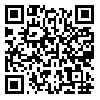BibTeX | RIS | EndNote | Medlars | ProCite | Reference Manager | RefWorks
Send citation to:
URL: http://rjms.iums.ac.ir/article-1-4840-en.html
2- Allameh-Tabatabaei University, Tehran, Iran, Allamehtabatabai university ,
3- Allameh-Tabatabaei University, Tehran, Iran, Allameh tabatabai
Background: Addiction is a biological, psychological and social disease that due to its progressive nature affects all dimensions of life of the individual, the family and the society. Current research aims at identification and prediction of effective variables on success of addiction treatment among addicts of Alborz Province Addiction Treatment Centers in 2016.
Methods: This is a descriptive correlational research. For this study, 400 successful and unsuccessful addicts in quitting addiction were selected using convenience sampling and Krejcie and Morgan Table. Both groups answered to Personality Inventory, Cognitive Emotion Regulation Questionnaire, Alexithymia Scale, Depression Anxiety Stress Scales, Spiritual Attitudes, and Perceived Social Support. Data were analyzed using discriminant analysis through SPSS v. 20.
Results: Findings showed that there were higher means for social support, spiritual attitude, extroversion, agreeableness, conscientiousness, and cognitive emotion regulation strategies among treated samples and higher means for depression, stress, alexithymia, and neurosis among addicted individuals. The differences between groups’ means for all variables at p=0.01 and for acceptance variable at p=0.05 were reported to be significant.
Conclusion: Among 18 predictable variables seven of them which consist of social support, negative affections, alexithymia, spiritual attitude, extroversion, agreeableness, positive reassessment, remained in the model which with the ability of 86.8 per cent can predict the success of addiction treatment.





